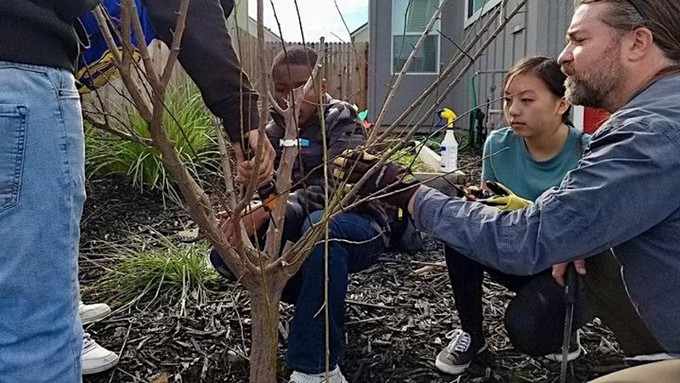
Alchemist CDC offers two free workshops in Sacramento

The skills and tools of fruit tree pruning are just part of two workshops offered this month by Alchemist Community Development Corporation. Photo courtesy Alchemist CDC
Learn a gardening skill – pruning fruit trees – while helping your community.
The Alchemist CDC is offering two free workshops, focusing on winter care for deciduous fruit trees. Participation is free for these hands-on events, but advance registration is necessary.
On Feb. 12, the workshop will be held at Oak Park Art Garden, 3834 Martin Luther King Jr. Blvd., Sacramento. (Register here: https://bit.ly/3K6WKjU.) On Feb. 19, the pruners in training will tackle Mirasol Village Community Garden, 701 Pipevine St., Sacramento (just south of Richards Boulevard). (Sign up here: https://bit.ly/3YYYwIr.)
Both pruning workshops will be held from 9 a.m. to 1 p.m. More details are available (search for "fruit tree pruning") via eventbrite.com.
“Learn the essential skills of winter fruit tree pruning at one of Sacramento’s community orchards,” say the organizers. “We’ll explore the craft of pruning, the tools that make it possible, and demonstrate the practice on fruit trees in the community orchard. We’ll also explore how urban agroforestry can play a significant role in enhancing the resilience of our urban ecosystems and communities to a changing climate.”
What is urban agroforestry? Growing (and managing) fruit trees in the city for residents to enjoy.
Dominic Allamano, an urban agroforester and experiential educator, will be the instructor for both workshops. According to his website bio, Allamano is working “at the intersection of urban food system repair, climate change adaptation and the long term re-connection of communities and the land they inhabit together.”
He worked for five years as the Edible City Coordinator at Soil Born Farms, developing an urban food forestry initiative that included the regional Harvest Sacramento fruit gleaning program, as well as garden building and fruit tree planting programs serving residents of South Sacramento, says his bio.
Focusing on food and nature, Alchemist Community Development Corporation is a fast-rising force for good in Sacramento-area neighborhoods – “connecting communities with land, food and opportunity.”
"Alchemist CDC is a mission-driven organization that connects Sacramento area communities to land, food, and opportunity toward a vision in which all neighborhoods are vibrant, equitable, healthy, and diverse,” according to the organization. “We are best known for enhancing the quality of life in under-resourced communities by improving access to nutritious foods, implementing community-supported public green spaces, and fostering economic self-sufficiency through business entrepreneurship.”
Details: https://alchemistcdc.org/.
Comments
0 comments have been posted.Sacramento Digs Gardening to your inbox.
Sites We Like
Garden Checklist for week of July 21
Your garden needs you!
* Keep your vegetable garden watered, mulched and weeded. Water before 8 a.m. to reduce the chance of fungal infection and to conserve moisture.
* Feed vegetable plants bone meal, rock phosphate or other fertilizers high in phosphate to stimulate more blooms and fruiting. (But wait until daily high temperatures drop out of the 100s.)
* Don’t let tomatoes wilt or dry out completely. Give tomatoes a deep watering two to three times a week.
* Harvest vegetables promptly to encourage plants to produce more. Squash especially tends to grow rapidly in hot weather. Keep an eye on zucchini.
* Pinch back chrysanthemums for bushy plants and more flowers in September.
* Remove spent flowers from roses, daylilies and other bloomers as they finish flowering.
* Pinch off blooms from basil so the plant will grow more leaves.
* Cut back lavender after flowering to promote a second bloom.
* It's not too late to add a splash of color. Plant petunias, snapdragons, zinnias and marigolds.
* From seed, plant corn, pumpkins, radishes, winter squash and sunflowers.